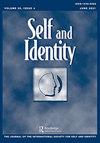性别刻板印象、智力表现和刻板印象验证:智力外行理论的作用
IF 2.1
4区 心理学
Q3 PSYCHOLOGY, SOCIAL
引用次数: 0
摘要
越来越多关于刻板印象验证的文献表明,在任务表现不佳后激活的消极的、自我相关的刻板印象可能会导致被污名化的个体更加确信自己表现不佳。目前的研究考察了这些影响的潜在调节因素:智力理论。在两项研究中,在参与者完成体育(研究1)或科学(研究2)知识测试后,对性别刻板印象可及性进行操纵。研究结果与持有智力增量理论的女性的刻板印象验证度增加一致。特别是,当消极的刻板印象在表演结束后变得突出时,这些女性对自己的糟糕表现表现出了更高的确定性。此外,这种增强的确定性预测了该领域后续性能的负面下游后果。本文章由计算机程序翻译,如有差异,请以英文原文为准。
Gender stereotypes, intellectual performance, and stereotype validation: The role of lay theories of intelligence
ABSTRACT A growing literature on stereotype validation suggests that negative, self-relevant stereotypes activated after poor task performance may lead stigmatized individuals to feel more certain they performed poorly. The present research examined a potential moderator of these effects: lay theories of intelligence. In two studies, gender stereotype accessibility was manipulated after participants finished a test of sports (Study 1) or science (Study 2) knowledge. Findings were consistent with increased stereotype validation among women who held incremental theories of intelligence. In particular, these women expressed elevated certainty in their poor performance when negative stereotypes were made salient after the performance. Furthermore, this enhanced certainty predicted negative downstream consequences for follow-up performance in the domain.
求助全文
通过发布文献求助,成功后即可免费获取论文全文。
去求助
来源期刊

Self and Identity
PSYCHOLOGY, SOCIAL-
CiteScore
5.10
自引率
5.00%
发文量
26
期刊介绍:
Work on self and identity has a special place in the study of human nature, as self-concerns are arguably at the center of individuals" striving for well-being and for making sense of one"s life. Life goals develop and are influenced by one"s view of what one is like, the way one would ideally like to be (or would like to avoid being), as well as one"s perceptions of what is feasible. Furthermore, conceptions of self and the world affect how one"s progress towards these goals is monitored, evaluated, redirected, re-evaluated, and pursued again. Thus, the “self” as a construct has far-reaching implications for behavior, self-esteem, motivation, experience of emotions and the world more broadly, and hence for interpersonal relationships, society, and culture.
 求助内容:
求助内容: 应助结果提醒方式:
应助结果提醒方式:


